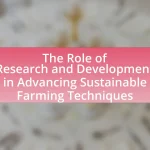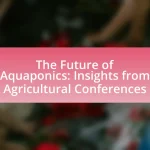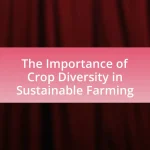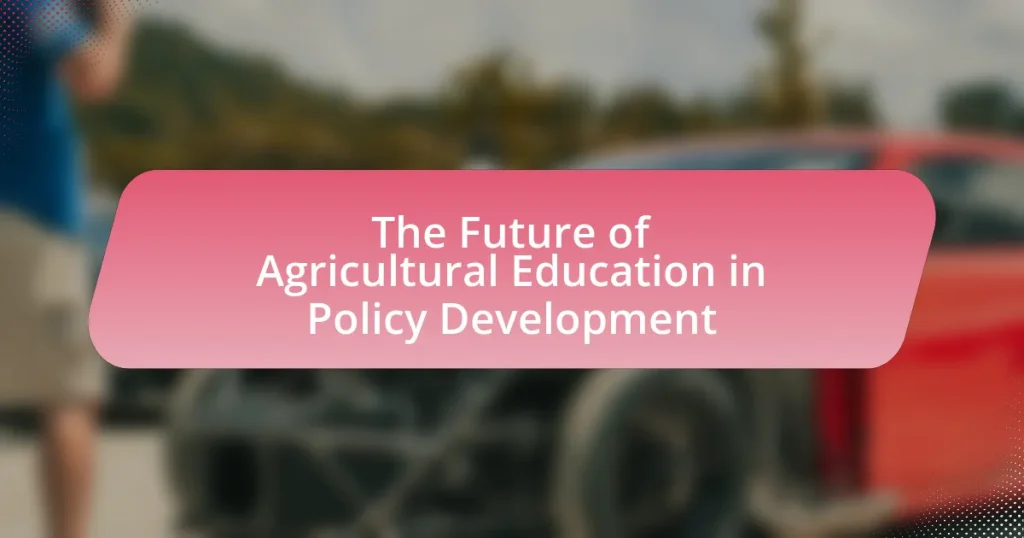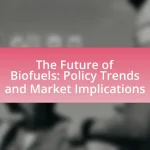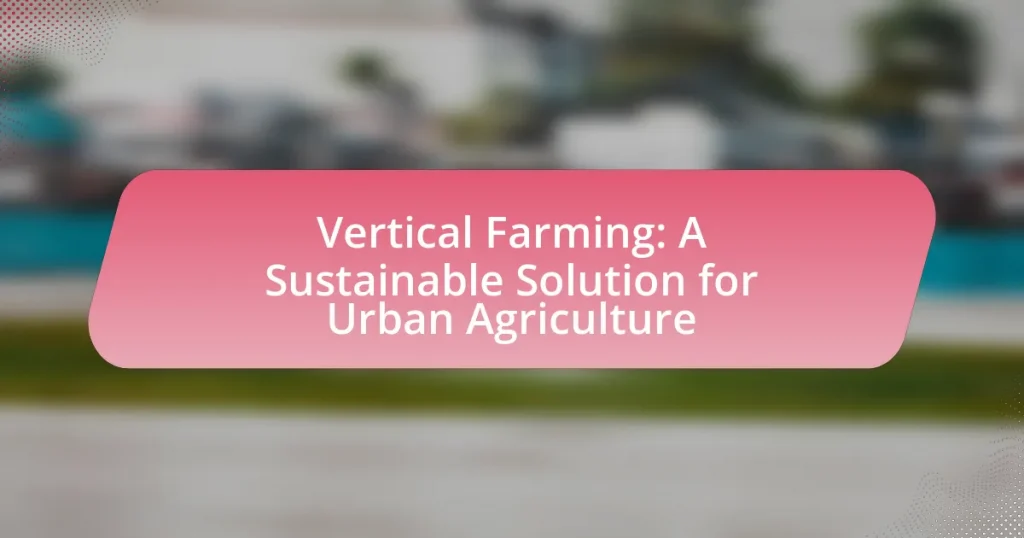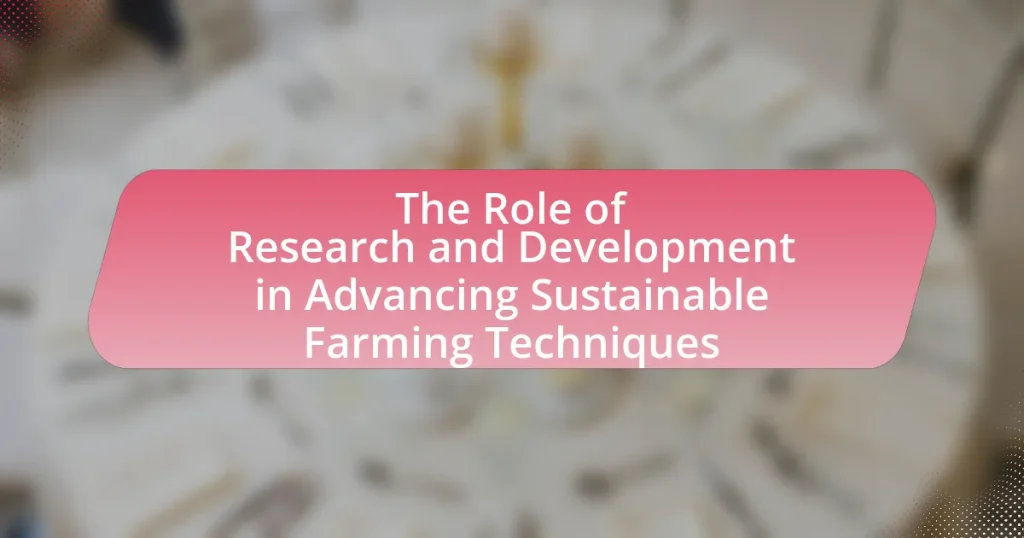The main entity of the article is agricultural education and its evolving role in policy development. The article examines how agricultural education is adapting to address global challenges such as climate change and food security by integrating sustainability, technology, and interdisciplinary approaches into curricula. It highlights key trends influencing agricultural education, the importance of practical training, and the impact of educational reforms on policy outcomes. Additionally, the article discusses the challenges faced by agricultural education, the necessity for stakeholder collaboration, and innovative strategies to enhance educational effectiveness in shaping future agricultural policies.
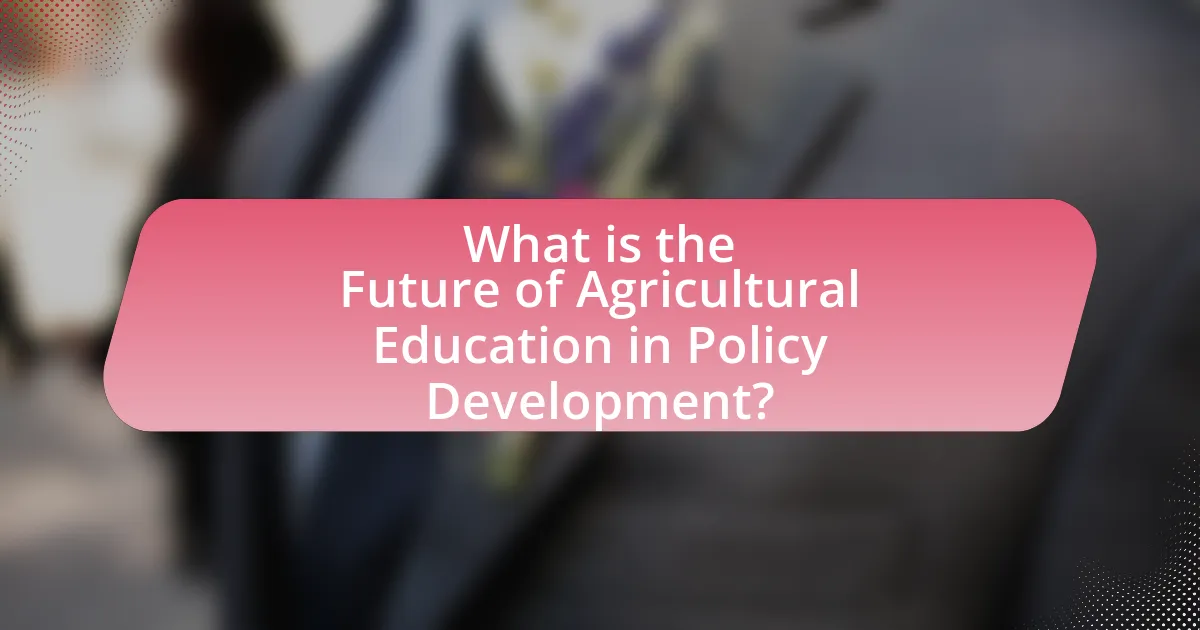
What is the Future of Agricultural Education in Policy Development?
The future of agricultural education in policy development is increasingly focused on integrating sustainability, technology, and interdisciplinary approaches. As global challenges such as climate change and food security intensify, agricultural education programs are evolving to equip students with the skills necessary for innovative policy-making. For instance, the incorporation of data analytics and precision agriculture into curricula prepares future leaders to make informed decisions that align with environmental and economic goals. Research from the Food and Agriculture Organization indicates that educational reforms in agriculture are essential for fostering adaptive capacities in policy frameworks, thereby enhancing resilience in agricultural systems.
How is agricultural education evolving in response to policy changes?
Agricultural education is evolving through the integration of sustainability practices and technology in response to policy changes aimed at addressing climate change and food security. Policies such as the Farm Bill in the United States have emphasized the need for educational programs that promote sustainable farming techniques and innovative agricultural technologies. For instance, the inclusion of funding for research and development in precision agriculture within these policies has led educational institutions to adapt their curricula to include data analytics and environmental stewardship, ensuring that future farmers are equipped with the necessary skills to meet modern agricultural challenges.
What are the key trends influencing agricultural education today?
Key trends influencing agricultural education today include the integration of technology, a focus on sustainability, and an emphasis on interdisciplinary approaches. The incorporation of precision agriculture technologies, such as drones and data analytics, enhances learning and prepares students for modern farming practices. Sustainability is increasingly prioritized in curricula, reflecting global concerns about climate change and resource management. Additionally, interdisciplinary approaches that combine agriculture with fields like environmental science, economics, and social sciences are becoming more common, fostering a holistic understanding of agricultural systems. These trends are supported by research indicating that educational programs that adapt to technological advancements and societal needs better equip students for future challenges in agriculture.
How do these trends impact policy development in agriculture?
Trends in agricultural education significantly influence policy development in agriculture by shaping the skills and knowledge required for modern farming practices. As new technologies and sustainable practices emerge, educational institutions adapt their curricula to prepare future farmers and agricultural professionals, which in turn informs policymakers about the necessary competencies for the workforce. For instance, the increasing emphasis on precision agriculture and climate-smart practices necessitates policies that support research funding and training programs, ensuring that farmers can effectively implement these innovations. Furthermore, data from the Food and Agriculture Organization indicates that countries investing in agricultural education see improved productivity and sustainability, reinforcing the need for policies that prioritize educational advancements in the sector.
Why is agricultural education important for effective policy development?
Agricultural education is crucial for effective policy development because it equips policymakers with the knowledge and skills necessary to address complex agricultural challenges. This education fosters an understanding of sustainable practices, economic viability, and social implications, enabling the formulation of informed policies that promote food security and environmental stewardship. For instance, research by the Food and Agriculture Organization highlights that countries with robust agricultural education systems are better positioned to implement policies that enhance productivity and resilience in the agricultural sector.
What role does education play in shaping agricultural policies?
Education plays a crucial role in shaping agricultural policies by equipping policymakers and stakeholders with the knowledge and skills necessary to address complex agricultural challenges. Through formal education programs, individuals gain insights into sustainable practices, economic viability, and technological advancements, which directly influence policy decisions. For instance, research conducted by the Food and Agriculture Organization highlights that countries with robust agricultural education systems tend to implement more effective policies that promote food security and environmental sustainability. This correlation underscores the importance of education in fostering informed decision-making and innovative solutions within agricultural policy frameworks.
How can agricultural education improve policy outcomes?
Agricultural education can improve policy outcomes by equipping policymakers with the knowledge and skills necessary to make informed decisions regarding agricultural practices and sustainability. This education fosters a deeper understanding of agricultural systems, enabling policymakers to create evidence-based policies that address challenges such as food security, environmental sustainability, and rural development. For instance, studies have shown that regions with strong agricultural education programs tend to implement more effective policies that enhance productivity and sustainability, as evidenced by the success of agricultural extension programs in countries like the United States and Brazil, which have led to increased crop yields and better resource management.
What challenges does agricultural education face in policy development?
Agricultural education faces several challenges in policy development, primarily including inadequate funding, lack of alignment with industry needs, and insufficient integration of technology. Inadequate funding limits the resources available for educational programs, which can hinder the development of comprehensive curricula. Additionally, a lack of alignment with industry needs results in graduates who may not possess the skills required by employers, leading to a skills gap in the agricultural workforce. Furthermore, insufficient integration of technology in educational policies can prevent students from gaining essential digital skills necessary for modern agricultural practices. These challenges collectively impede the effectiveness and relevance of agricultural education in preparing future professionals for the sector.
What are the barriers to integrating education into policy frameworks?
Barriers to integrating education into policy frameworks include lack of funding, insufficient stakeholder engagement, and inadequate data on educational outcomes. Lack of funding limits the resources available for educational initiatives, making it difficult to implement comprehensive policies. Insufficient stakeholder engagement, particularly from educators and industry professionals, results in policies that do not reflect the needs of the education system or the agricultural sector. Additionally, inadequate data on educational outcomes hinders the ability to assess the effectiveness of existing policies and make informed decisions for future improvements. These barriers collectively impede the development of effective educational policies in agriculture.
How can these challenges be addressed to enhance agricultural education?
To address challenges in agricultural education, integrating technology and hands-on learning experiences is essential. Implementing digital tools, such as online platforms for virtual learning and simulation software, can enhance accessibility and engagement for students. Research indicates that technology integration in education improves student outcomes; for instance, a study by the International Society for Technology in Education found that 75% of teachers reported increased student engagement when using technology in the classroom. Additionally, fostering partnerships between educational institutions and agricultural industries can provide real-world experiences and internships, bridging the gap between theory and practice. This approach not only equips students with relevant skills but also aligns educational programs with industry needs, ensuring a more effective agricultural education system.
How can stakeholders collaborate to improve agricultural education in policy development?
Stakeholders can collaborate to improve agricultural education in policy development by forming partnerships that integrate diverse expertise and resources. Collaborative efforts can include joint initiatives between government agencies, educational institutions, industry representatives, and non-profit organizations to create comprehensive curricula that address current agricultural challenges. For instance, the USDA’s National Institute of Food and Agriculture has successfully partnered with universities and local organizations to enhance agricultural education programs, demonstrating that such collaborations can lead to more relevant and effective educational outcomes. These partnerships can also facilitate the sharing of best practices and innovative teaching methods, ultimately leading to a more skilled workforce in the agricultural sector.
What innovative approaches can be adopted in agricultural education?
Innovative approaches that can be adopted in agricultural education include the integration of technology, experiential learning, and interdisciplinary curricula. The use of precision agriculture technologies, such as drones and data analytics, enhances students’ understanding of modern farming practices. Experiential learning, through hands-on projects and internships, allows students to apply theoretical knowledge in real-world settings, fostering practical skills. Interdisciplinary curricula that combine agriculture with environmental science, economics, and technology prepare students for the complexities of the agricultural sector. These approaches are supported by studies indicating that technology-enhanced learning increases student engagement and retention rates, ultimately leading to a more skilled workforce in agriculture.
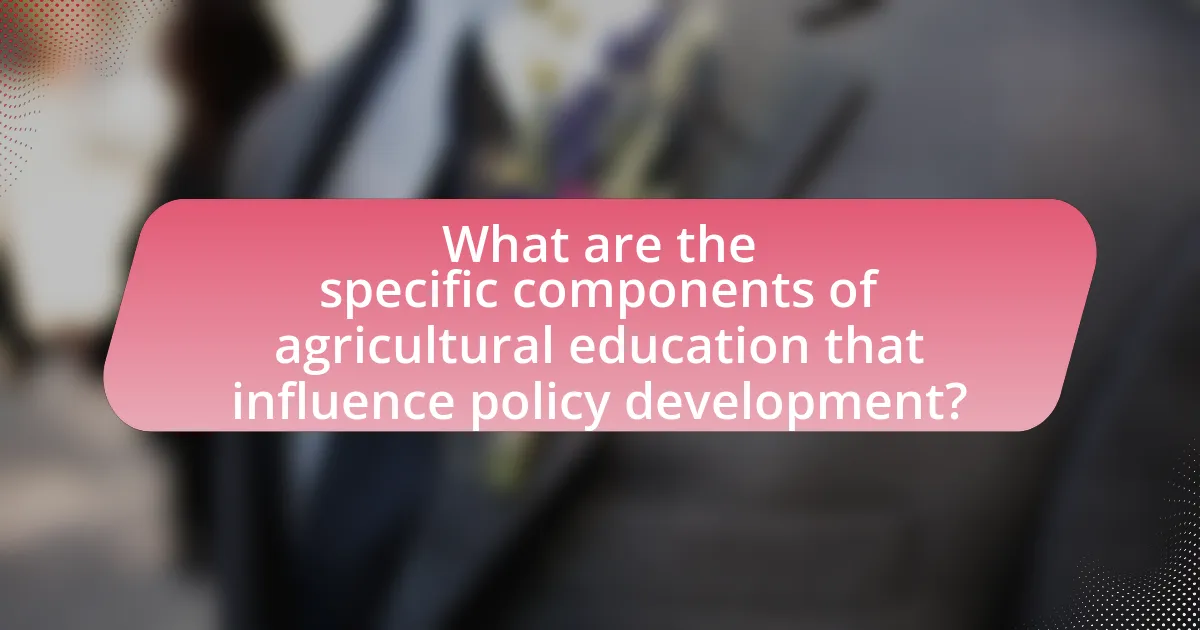
What are the specific components of agricultural education that influence policy development?
The specific components of agricultural education that influence policy development include curriculum design, stakeholder engagement, research initiatives, and practical training programs. Curriculum design shapes the knowledge base and skills that future agricultural professionals acquire, directly impacting their ability to inform and influence policy decisions. Stakeholder engagement, which involves collaboration with farmers, industry leaders, and policymakers, ensures that educational programs address real-world challenges and align with current agricultural needs. Research initiatives contribute evidence-based insights that guide policy formulation, while practical training programs equip students with hands-on experience, fostering a workforce capable of implementing effective agricultural policies. These components collectively enhance the relevance and effectiveness of agricultural education in shaping policy development.
How do curriculum changes affect policy development in agriculture?
Curriculum changes significantly influence policy development in agriculture by aligning educational outcomes with industry needs and emerging challenges. When agricultural curricula are updated to include contemporary issues such as sustainability, technology integration, and climate change, they prepare students to address these critical areas, thereby informing policymakers about necessary regulations and support systems. For instance, the incorporation of precision agriculture techniques in educational programs has led to policies that promote technological adoption among farmers, enhancing productivity and environmental stewardship. This alignment ensures that agricultural policies are based on the latest knowledge and practices, ultimately leading to more effective and relevant agricultural strategies.
What subjects are essential for future agricultural policy leaders?
Future agricultural policy leaders must have a strong foundation in economics, environmental science, and agricultural policy. Economics equips leaders with the skills to analyze market trends and make informed financial decisions, which is crucial for developing sustainable agricultural practices. Environmental science provides an understanding of ecological systems and the impact of agriculture on the environment, enabling leaders to create policies that promote sustainability. Agricultural policy courses teach the regulatory frameworks and governance structures that shape the agricultural sector, ensuring leaders can navigate complex policy landscapes effectively. These subjects collectively prepare future leaders to address the multifaceted challenges in agriculture, such as food security, climate change, and resource management.
How can practical training be integrated into agricultural education?
Practical training can be integrated into agricultural education through hands-on experiences, such as internships, fieldwork, and partnerships with local farms. These methods allow students to apply theoretical knowledge in real-world settings, enhancing their skills and understanding of agricultural practices. Research indicates that experiential learning significantly improves student engagement and retention of information, as evidenced by a study published in the Journal of Agricultural Education and Extension, which found that students who participated in practical training reported higher levels of satisfaction and preparedness for their careers.
What role do technology and digital tools play in agricultural education?
Technology and digital tools play a crucial role in agricultural education by enhancing learning experiences and improving access to information. These tools facilitate interactive learning through simulations, online courses, and virtual field trips, allowing students to engage with real-world agricultural practices. For instance, the use of precision agriculture technologies, such as drones and data analytics, provides students with hands-on experience in modern farming techniques. Research indicates that integrating digital tools in agricultural curricula can increase student engagement and knowledge retention, as evidenced by a study published in the Journal of Agricultural Education and Extension, which found that students exposed to technology-driven learning environments demonstrated a 30% improvement in practical skills compared to traditional methods.
How can online learning platforms enhance agricultural education?
Online learning platforms can enhance agricultural education by providing accessible, flexible, and diverse learning resources tailored to various agricultural topics. These platforms enable learners to access expert-led courses, interactive simulations, and real-time data analysis, which are crucial for understanding modern agricultural practices. For instance, a study by the Food and Agriculture Organization (FAO) highlights that online education can reach remote areas, allowing farmers to learn about sustainable practices and new technologies without geographical constraints. Additionally, platforms like Coursera and edX offer courses from leading universities, ensuring that learners receive high-quality education that is relevant to current agricultural challenges.
What technologies are transforming agricultural education and policy development?
Digital technologies, including online learning platforms, data analytics, and precision agriculture tools, are transforming agricultural education and policy development. Online learning platforms enable access to agricultural education for a broader audience, facilitating knowledge dissemination and skill development. Data analytics allows policymakers to make informed decisions based on real-time agricultural data, improving policy effectiveness. Precision agriculture tools, such as GPS and IoT devices, enhance farming practices and inform educational curricula by integrating technology into traditional farming methods. These technologies collectively enhance the quality and accessibility of agricultural education while informing and shaping effective agricultural policies.
How can research and data inform agricultural education and policy development?
Research and data can inform agricultural education and policy development by providing evidence-based insights that guide curriculum design and regulatory frameworks. For instance, studies such as “The Role of Agricultural Education in Sustainable Development” published in the Journal of Agricultural Education and Extension demonstrate that integrating data on sustainable practices into educational programs enhances student understanding and application of these concepts in real-world scenarios. Furthermore, data analytics can identify gaps in knowledge and skills among agricultural professionals, allowing policymakers to tailor educational initiatives that address specific needs, as evidenced by the USDA’s National Agricultural Statistics Service reports which highlight trends in agricultural workforce demands. This alignment of research findings with educational strategies ensures that agricultural education remains relevant and effective in meeting both current and future challenges in the sector.
What types of research are most beneficial for agricultural education?
Applied research, particularly in areas such as sustainable farming practices, technology integration, and agricultural economics, is most beneficial for agricultural education. This type of research directly addresses real-world challenges faced by farmers and agricultural educators, providing practical solutions and enhancing curriculum relevance. For instance, studies on precision agriculture have shown that implementing technology can increase crop yields by up to 20%, demonstrating the tangible benefits of integrating such research into educational programs. Additionally, research on the economic impacts of agricultural policies helps educators prepare students for the complexities of the agricultural industry, ensuring they are equipped with the knowledge to navigate future challenges.
How can data analytics improve policy decision-making in agriculture?
Data analytics can significantly enhance policy decision-making in agriculture by providing data-driven insights that inform strategies and interventions. By analyzing large datasets related to crop yields, weather patterns, and market trends, policymakers can identify effective practices and allocate resources more efficiently. For instance, a study by the Food and Agriculture Organization (FAO) highlighted that data analytics can improve food security by predicting agricultural outputs and optimizing supply chains, ultimately leading to better-informed policies that address food shortages and price volatility. This evidence demonstrates that leveraging data analytics leads to more precise and effective agricultural policies.
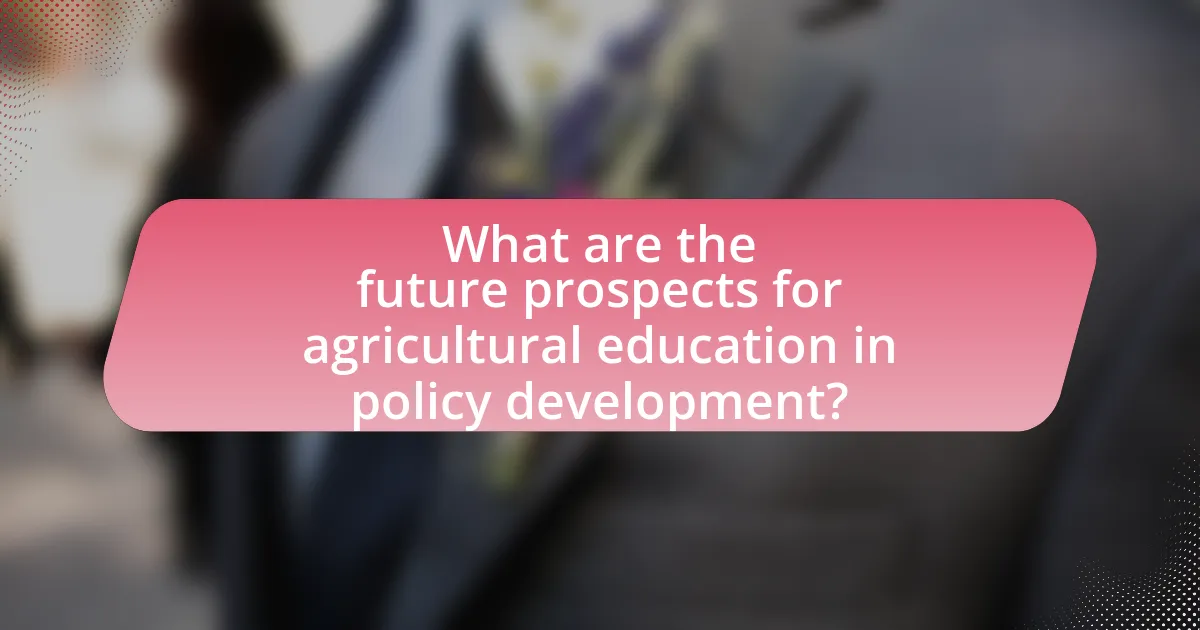
What are the future prospects for agricultural education in policy development?
The future prospects for agricultural education in policy development are promising, as they are increasingly recognized as essential for addressing global challenges such as food security, climate change, and sustainable practices. Agricultural education is evolving to incorporate interdisciplinary approaches, integrating technology and environmental science, which enhances its relevance in policy discussions. For instance, the Food and Agriculture Organization (FAO) emphasizes the need for education systems to adapt to new agricultural practices and technologies, ensuring that future policymakers are equipped with the necessary knowledge and skills. This shift is supported by initiatives like the Global Forum on Agricultural Research and Innovation, which advocates for educational reforms that align with sustainable development goals.
How can agricultural education adapt to future challenges in policy development?
Agricultural education can adapt to future challenges in policy development by integrating interdisciplinary approaches that encompass environmental science, economics, and social equity. This adaptation is essential as policies increasingly require a holistic understanding of agricultural systems and their impacts. For instance, the incorporation of climate-smart agriculture principles into curricula prepares students to address the complexities of climate change and food security, which are critical areas of policy focus. Research from the Food and Agriculture Organization highlights that educational programs that emphasize sustainability and innovation lead to more effective policy implementation and community resilience. By fostering partnerships with policymakers and industry stakeholders, agricultural education can ensure that curricula remain relevant and responsive to emerging challenges.
What skills will be essential for future agricultural policy professionals?
Future agricultural policy professionals will need strong analytical skills, effective communication abilities, and a deep understanding of agricultural economics. Analytical skills are essential for evaluating data and trends in agriculture, which helps in formulating evidence-based policies. Effective communication is crucial for articulating policy recommendations to stakeholders, including farmers, government officials, and the public. A solid grasp of agricultural economics enables professionals to assess the financial implications of policies and understand market dynamics. These skills are supported by the increasing complexity of agricultural systems and the need for informed decision-making in policy development.
How can educational institutions prepare students for evolving agricultural policies?
Educational institutions can prepare students for evolving agricultural policies by integrating interdisciplinary curricula that encompass policy analysis, sustainable practices, and technological advancements in agriculture. This approach equips students with the necessary skills to understand and adapt to changes in agricultural regulations and practices. For instance, programs that include case studies on recent agricultural policy shifts, such as the 2018 Farm Bill in the United States, provide students with real-world contexts to analyze the implications of policy changes. Additionally, partnerships with agricultural organizations and policymakers can offer students hands-on experiences and insights into the policymaking process, further enhancing their readiness for future challenges in the agricultural sector.
What best practices can be implemented in agricultural education for effective policy development?
Best practices that can be implemented in agricultural education for effective policy development include integrating experiential learning, fostering stakeholder collaboration, and utilizing data-driven decision-making. Experiential learning, such as hands-on training and fieldwork, enhances students’ understanding of real-world agricultural challenges, which is essential for informed policy-making. Collaboration among educators, policymakers, and industry stakeholders ensures that diverse perspectives are considered, leading to more comprehensive and effective policies. Furthermore, employing data-driven decision-making allows for the analysis of agricultural trends and outcomes, enabling the formulation of policies based on empirical evidence rather than assumptions. These practices collectively contribute to a more robust agricultural education framework that supports effective policy development.
How can experiential learning be utilized in agricultural education?
Experiential learning can be utilized in agricultural education by integrating hands-on activities, such as fieldwork, internships, and simulations, into the curriculum. This approach allows students to apply theoretical knowledge in real-world agricultural settings, enhancing their understanding and skills. Research indicates that experiential learning significantly improves retention rates and practical skills among students; for instance, a study published in the Journal of Agricultural Education and Extension found that students engaged in experiential learning reported a 30% increase in their ability to apply concepts learned in the classroom to actual farming practices. By fostering critical thinking and problem-solving skills, experiential learning prepares students for the complexities of modern agriculture, aligning educational outcomes with industry needs.
What partnerships can enhance the effectiveness of agricultural education programs?
Collaborations with local agricultural businesses, universities, and government agencies can significantly enhance the effectiveness of agricultural education programs. These partnerships provide students with practical experience, access to the latest research, and resources that align educational content with industry needs. For instance, partnerships with universities can facilitate internships and research opportunities, while collaborations with local businesses can offer hands-on training and job placement for graduates. Additionally, government agencies can support these programs through funding and policy initiatives that promote agricultural education, ensuring that curricula remain relevant and impactful.
What are the key takeaways for improving agricultural education in policy development?
Key takeaways for improving agricultural education in policy development include integrating practical experience with theoretical knowledge, enhancing collaboration between educational institutions and agricultural industries, and promoting interdisciplinary approaches. Research indicates that hands-on training significantly boosts student engagement and skill acquisition, as evidenced by programs that combine classroom learning with fieldwork. Additionally, partnerships between universities and agricultural businesses can ensure curricula remain relevant to current industry needs, fostering a workforce equipped with applicable skills. Interdisciplinary approaches, which incorporate economics, environmental science, and technology, prepare students to tackle complex agricultural challenges, as highlighted in studies showing improved problem-solving abilities among graduates.

